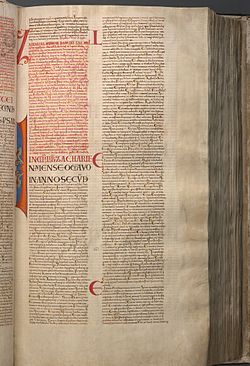
The Book of Haggai is a book of the Hebrew Bible or Tanakh, and is the third-to-last of the Twelve Minor Prophets. It is a short book, consisting of only two chapters. The historical setting dates around 520 BC before the Temple had been rebuilt. The original text was written in Biblical Hebrew.
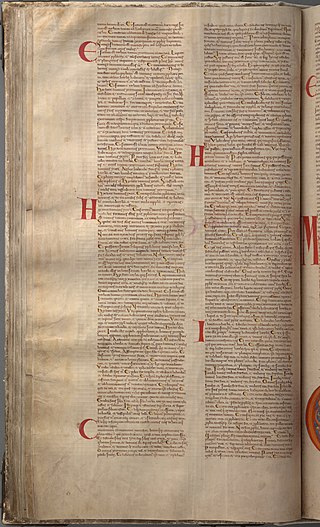
Zechariah 12 is the twelfth of the total 14 chapters in the Book of Zechariah in the Hebrew Bible and the Old Testament of the Christian Bible. This book contains the prophecies attributed to the prophet Zechariah, and is a part of the Book of the Twelve Minor Prophets. This chapter is a part of a section consisting of Zechariah 9–14. This chapter and chapter 13 verses 1–6 are a section, forming a three-section "entity" with 13:7–9 and 14:1-21.
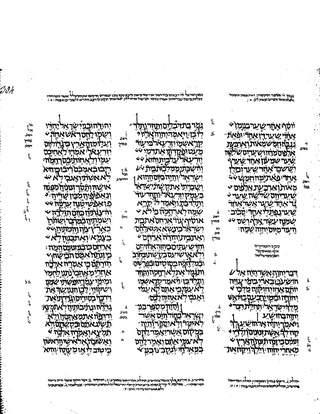
Zephaniah 2 is the second chapter of the Book of Zephaniah in the Hebrew Bible or the Old Testament of the Christian Bible. This book contains the prophecies attributed to the prophet Zephaniah, and is a part of the Book of the Twelve Minor Prophets. This chapter contains a call to penitence and oracles against nations.

Zechariah 3 is the third of the total 14 chapters in the Book of Zechariah in the Hebrew Bible or the Old Testament of the Christian Bible. This book contains the prophecies attributed to the prophet Zechariah, and is a part of the Book of the Twelve Minor Prophets. The chapter contains the vision of Joshua, the high priest, being cleansed before God. It is a part of a section consisting of Zechariah 1–8.

Zechariah 2 is the second of the total 14 chapters in the Book of Zechariah in the Hebrew Bible or the Old Testament of the Christian Bible. This book contains the prophecies attributed to the prophet Zechariah, and is a part of the Book of the Twelve Minor Prophets. This chapter is a part of a section consisting of Zechariah 1–8. It records the third of eight visions received by the prophet, followed by an oracle calling the exiles to return to the city where Yahweh is about to dwell and all nations will come.

Zechariah 1 is the first chapter of the Book of Zechariah in the Hebrew Bible or the Old Testament of the Christian Bible. This book contains the prophecies attributed to the prophet Zechariah, and is a part of the Book of the Twelve Minor Prophets. As the first of the total 14 chapters in the book, this chapter is a part of a section consisting of Zechariah 1-8. It records an introduction and the first two of eight visions received by the prophet.

Zechariah 5 is the fifth of the total 14 chapters in the Book of Zechariah in the Hebrew Bible or the Old Testament of the Christian Bible. This book contains the prophecies attributed to the prophet Zechariah, and is a part of the Book of the Twelve Minor Prophets. This chapter records the sixth and seventh of the eight visions of Zechariah which are compiled in a section consisting of Zechariah 1–8.

Zechariah 6 is the sixth of the total 14 chapters in the Book of Zechariah in the Hebrew Bible or the Old Testament of the Christian Bible. This book contains the prophecies attributed to the prophet Zechariah, and is a part of the Book of the Twelve Minor Prophets. This chapter contains the description of the eighth vision and the crowning of Joshua. It is a part of a section consisting of Zechariah 1–8.

Zechariah 7 is the seventh of the total 14 chapters in the Book of Zechariah in the Hebrew Bible or the Old Testament of the Christian Bible. This book contains the prophecies attributed to the prophet Zechariah, and is a part of the Book of the Twelve Minor Prophets. This chapter is a part of a section consisting of Zechariah 1–8. The Jews having sent to inquire concerning the set fasts, Zechariah 7:1-3, Zechariah reproves the hypocrisy of their fasts, Zechariah 7:4-7, and they are exhorted by repentance to remove the cause of their calamity, Zechariah 7:8-14.
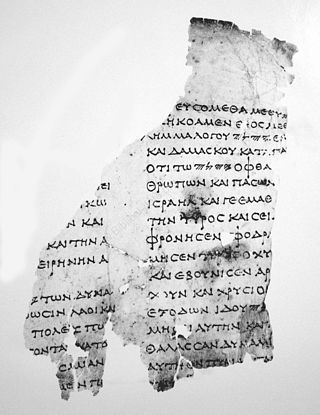
Zechariah 8 is the eighth of the total 14 chapters in the Book of Zechariah in the Hebrew Bible or the Old Testament of the Christian Bible. This book contains the prophecies attributed to the prophet Zechariah, and is a part of the Book of the Twelve Minor Prophets. This chapter is a part of a section consisting of Zechariah 1–8. This chapter contains a continuation of the subject in the seventh chapter.
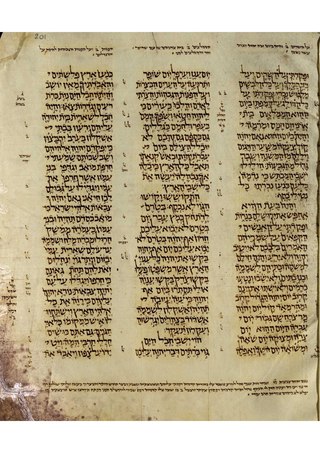
Zechariah 9 is the ninth of the total 14 chapters in the Book of Zechariah in the Hebrew Bible or the Old Testament of the Christian Bible. This book contains the prophecies attributed to the prophet Zechariah, and is a part of the Book of the Twelve Minor Prophets. This chapter is a part of a section consisting of Zechariah 9–14. It concerns about the advance of an enemy, but God defends Jerusalem and his king will triumphantly enter the city to bring peace among all nations. This chapter also contains a continuation of the subject in the seventh chapter. The part about the king's entry into Jerusalem is quoted in the New Testament, especially in the event of Jesus' triumphal entry into Jerusalem.

Zechariah 10 is the tenth of the total 14 chapters in the Book of Zechariah in the Hebrew Bible or the Old Testament of the Christian Bible. This book contains the prophecies attributed to the prophet Zechariah, and is a part of the Book of the Twelve Minor Prophets. This chapter is a part of a section consisting of Zechariah 9–14.

Zechariah 11 is the eleventh of the total 14 chapters in the Book of Zechariah in the Hebrew Bible or the Old Testament of the Christian Bible. This book contains the prophecies attributed to the prophet Zechariah, and is a part of the Book of the Twelve Minor Prophets. This chapter is a part of a section consisting of Zechariah 9–14.

Zechariah 13 is the thirteenth of the total 14 chapters in the Book of Zechariah in the Hebrew Bible or the Old Testament of the Christian Bible. This book contains the prophecies attributed to the prophet Zechariah, and is a part of the Book of the Twelve Minor Prophets. This chapter is a part of a section consisting of Zechariah 9–14. Verses 1–6 may be a part of a section together with 12:1-14, whereas verses 7–9 is a separate part, forming a three-section "entity" with 14:1-21.
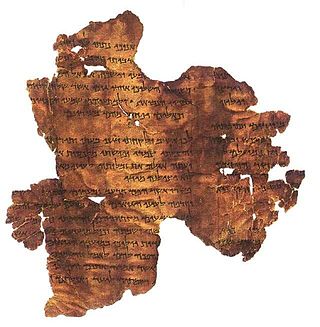
Hosea 4 is the fourth chapter of the Book of Hosea in the Hebrew Bible or the Old Testament of the Christian Bible. This book contains the prophecies attributed to the prophet Hosea son of Beeri. In this chapter he reproves the people and priests for their sins in the interregnum following Jeroboam's death; hence there is no mention of the king or his family; and in Hosea 4:2 bloodshed and other evils usual in a civil war are specified. It is a part of the Book of the Twelve Minor Prophets.

Hosea 7 is the seventh chapter of the Book of Hosea in the Hebrew Bible or the Old Testament of the Christian Bible. The book contains the prophecies attributed the prophet Hosea son of Beeri and this chapter is about Israel reproved for multiple sins resulting in God's wrath against them for their hypocrisy. It is a part of the Book of the Twelve Minor Prophets.

Ezekiel 2 is the second chapter of the Book of Ezekiel in the Hebrew Bible or the Old Testament of the Christian Bible. This book contains the prophecies attributed to the prophet/priest Ezekiel and is one of the Book of the Prophets. In this chapter, set within a wider section from Ezekiel 1:28b to Ezekiel 3:15, "Ezekiel receives a commission [from God] to go to the 'rebellious house' of Israel" and to speak for God.

Ezekiel 41 is the forty-first chapter of the Book of Ezekiel in the Hebrew Bible or the Old Testament of the Christian Bible. This book contains the prophecies attributed to the prophet/priest Ezekiel, and is one of the Books of the Prophets. The Jerusalem Bible refers to the final section of Ezekiel, chapters 40-48, as "the Torah of Ezekiel". This chapter continues Ezekiel's vision of a future Temple.

Ezekiel 47 is the forty-seventh chapter of the Book of Ezekiel in the Hebrew Bible or the Old Testament of the Christian Bible.

Ezra 5 is the fifth chapter of the Book of Ezra in the Old Testament of the Christian Bible, or the book of Ezra-Nehemiah in the Hebrew Bible, which treats the book of Ezra and book of Nehemiah as one book. Jewish tradition states that Ezra is the author of Ezra-Nehemiah as well as the Book of Chronicles, but modern scholars generally accept that a compiler from the 5th century BCE is the final author of these books. The section comprising chapter 1 to 6 describes the history before the arrival of Ezra to the land of Judah in 468 BCE. This chapter records the contribution of the prophets Haggai and Zechariah to the temple building project and the investigation by Persian officials.
